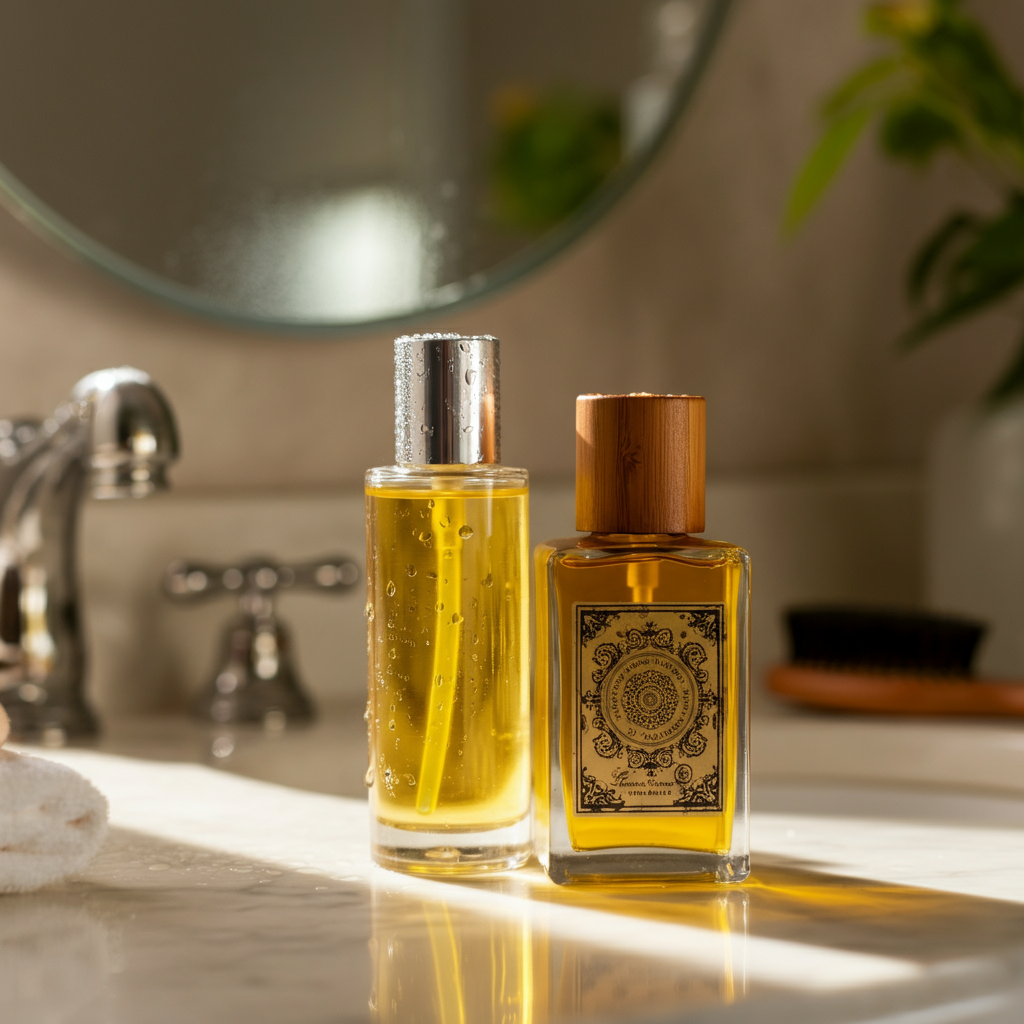
Have you ever looked at the endless bottles of hair products on the shelves and wondered, should I be using hair serum or hair oil? With a myriad of choices, understanding which product caters better to your hair’s unique needs can save you time, effort, and money while ensuring your locks look their absolute best.
This blog will guide you through the differences, benefits, and practical uses of hair serum and hair oil so that you can make an informed decision. By the end, you’ll know exactly which product is right for your hair type and styling goals.
What Is Hair Serum?
What exactly does hair serum do for your hair?
Hair serum is a lightweight, silicone-based product designed to coat the surface of your hair. Perfect for styling and protection, it helps create a sleek, polished look while providing added shine and hydration.
Key Features of Hair Serum:
- Frizz Control: Hair serum creates a protective layer around your strands, reducing friction and taming flyaways.
- Heat Protection: It acts as a shield against heat styling tools like straighteners and curling irons, as well as environmental stressors.
- Shine and Smoothness: Enhances your hair’s appearance by adding a glossy, polished touch.
Best Use Cases:
Hair serums are ideal for those looking to tackle concerns like frizz, dullness, or damage after heat styling. They’re also perfect for people with thin or fine hair, as they provide hydration and sleekness without weighing down your locks.
What Is Hair Oil?
How does hair oil work differently from serum, and when should you use it?
Hair oil is often made from natural, nutrient-rich oils like coconut, argan, almond, or jojoba. Unlike serums, which only coat your hair, oils penetrate deeply to nourish the scalp and strands, offering long-term results with consistent use.
Key Features of Hair Oil:
- Deep Nourishment: Penetrates the hair shaft to deliver hydration and nutrients.
- Scalp Care: Ideal for addressing dryness, dandruff, or itchiness.
- Stronger Hair: Helps repair damage, seal split ends, and improve hair health over time.
Best Use Cases:
Hair oils work best for those with dry, coarse, or thick hair and anyone dealing with scalp concerns or extensive heat or chemical damage.
Hair Serum vs Hair Oil: What’s the Key Difference?
How do these two products really compare, and what makes them different?
While both products play an essential role in hair care, they cater to distinct needs.
Texture and Consistency:
-
- Hair Serum: Lightweight, non-greasy, and designed for styling.
- Hair Oil: Thicker and focuses on nourishing and repairing.
Usage:
-
- Hair Serum: Ideal for post-shower styling and protection.
- Hair Oil: Works as a pre-shampoo treatment or overnight mask.
Results:
-
- Serum: Provides instant smoothness and shine.
- Oil: Delivers long-term hydration and strength.
Which Product Is Better for Your Hair Type?
Does your hair type determine which product you should use?
The answer is yes. Here’s what works best for different hair textures and needs:
- Fine Hair: Hair serum is your go-to. Its lightweight texture adds shine without weighing your hair down.
- Thick or Curly Hair: Opt for hair oil to deeply hydrate and ensure every strand gets the nourishment it needs.
- Damaged Hair:
- Use hair oil for scalp repair and hydration.
- Use hair serum for post-treatment styling and frizz control.
Can You Use Both Hair Serum and Hair Oil Together?
Is it possible to benefit from both hair serum and oil, or is it one or the other?
The great news is that you can use both! Here’s how to combine them effectively:
When to Use Both:
- Apply hair serum after washing your hair to tame frizz and add shine.
- Use hair oil as a pre-treatment or deep conditioning mask to strengthen and hydrate.
Things to Keep in Mind:
- Overusing both can lead to product buildup or greasy hair.
- Alternate based on your needs—use oil a couple of times per week and serum for daily styling.
Which Product Should You Use for Specific Hair Concerns?
Do you have specific hair problems like frizz or split ends? Which product works best?
Here’s a quick guide for common hair concerns:
- Frizz Control: Use serum to instantly smooth out flyaways.
- Dry Scalp: Hair oil deeply hydrates and improves scalp health over time.
- Split Ends: Hair oil repairs and strengthens damaged ends.
- Heat Protection: Serum acts as a barrier against heat-styling tools.
How to Apply Hair Serum and Hair Oil Correctly
Is there a right way to apply hair serum or oil to get the best results?
Step-by-Step Application:
Hair Serum:
- Take a small amount (pea-sized for short hair, dime-sized for longer hair).
- Rub it between your palms and gently work it through damp hair, focusing on mid-lengths and ends.
- Avoid applying too close to the roots to prevent greasiness.
Hair Oil:
- Massage a small amount into your scalp and hair lengths.
- Leave it on for at least 30 minutes or overnight before shampooing.
- Rinse thoroughly to avoid residue.
Common Mistakes to Avoid When Using Hair Serum or Oil
Are you making these mistakes with your hair products?
Overusing the Product:
- Too much oil or serum can weigh down your hair and make it greasy.
Applying on Dirty Hair:
- Always start with clean, damp hair to ensure effective absorption.
Not Distributing Evenly:
- Focus on spreading the product evenly across hair strands for uniform results.
Should You Choose Hair Serum or Hair Oil?
Now that you know the differences, which product will work best for you?
Here’s a quick decision guide to help you out:
Hair Serum :
- You’re looking for immediate styling benefits like frizz control or shine.
- Your hair is fine, straight, or prone to tangling.
Hair Oil :
- You want deep nourishment to repair damaged strands from the inside out.
- Your hair is dry, thick, or curly.
Ultimately, the choice boils down to your hair type, concerns, and goals. Many people benefit from using both products as part of their routine!
Share Your Experience
What’s your go-to hair care product? Do you swear by serums or oils for your hair routine? Share your experience in the comments below—we’d love to hear from you!







